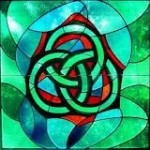The Unknown Trinity
A sermon preached at the Church of the Incarnation, San Francisco, by Christopher L. Webber on June 11, 2017.
I have ordained friends who hate having to preach on Trinity Sunday. I think they find it hard to explain how three is one and one is three. But that’s  exactly the point. It IS hard to explain, and if you try, you will fail.
exactly the point. It IS hard to explain, and if you try, you will fail.
I had a guest preacher once on Trinity Sunday and at the door after the service one lady thanked him effusively for explaining the Trinity: she said she’d never understood it before and now she did. The guest preacher looked puzzled and said, “I must have said something wrong.” Yes! If you understand it, you’ve got it wrong!
One of the great additions to the 1979 Prayer Book is the Athanasian Creed which has always been in the English Prayer Book. If you’ve never read it, you should look it up; it’s on page 864 – but don’t look now! The Athanasian Creed begins this way:
“Whosoever will be saved, above all things it is necessary that he hold the Catholic faith. Now the Catholic faith is this: . . . That we worship one God in Trinity, and Trinity in Unity; Neither confounding the Persons; nor dividing the Essence. For there is one Person of the Father; another of the Son; and another of the Holy Ghost. . . Such as the Father is; such is the Son; and such is the Holy Ghost. The Father uncreated; the Son uncreated; and the Holy Ghost uncreated. The Father incomprehensible; the Son incomprehensible; and the Holy Ghost incomprehensible.”
And it’s often said, “The whole thing incomprehensible.”
Yes, and what did you expect? That you could understand God? Our first American Prayer Book was compiled, of course, in the 18th Century, the Age of Hamilton, the so-called “Age of Reason” and they almost dropped not only the Athenasian Creed but the Nicene Creed as well. John Toland, a leading English philosopher of the early 18th century, wrote a book called “Christianity not mysterious, or, A treatise shewing that there is nothing in the Gospel contrary to reason, . . . and that no Christian doctrine can be properly call’d a mystery.” But, you know, the 18th century – as I said, The Age of Reason – was the time when they had it all figured out. They knew the earth was round and the earth moved around the sun and all that.
They thought they knew it all. Thomas Paine wrote the book on it and called it “The Age of Reason.” He said we should replace revelation with reason, and reject miracles and see the Bible as “an ordinary piece of literature rather than as a divinely inspired text.” That was then, and this is now, and the scientists have done more to reveal the mystery of being than Paine could ever have imagined. To reveal the mystery, not to understand it.
A couple of weeks ago we had a reading from the Acts of the Apostles that told how Paul arrived in Athens and set out to preach for the first time to Gentiles and he told them that as he had wandered around their city he had seen a number of altars to various gods and he had seen one that was inscribed “To the Unknown God.” For the Athenians, I suppose it was like an insurance policy: “If there’s a god we left out, this one’s for you: The Unknown God.” That unknown God, said Paul, is the God I proclaim.
Yes! Me too! The Unknown God. Put the sign on this altar: to the Unknown God. I’ve been saying that it’s science that reveals this God and to a point that’s right. If I didn’t know that it would take a zillion years traveling at the speed of light to get to the edge of the universe and that when I got there it  would have expanded a zillion light years more, I might claim understanding. If I didn’t know that I can know the location of an electron or its direction but not both at the same time, I might claim to understand. If I hadn’t been exposed to modern science, if I had been born into the eighteenth century, I might claim to understand God and have no need to worship. But I’m here in this century and I know too much to begin to imagine that I know it all.
would have expanded a zillion light years more, I might claim understanding. If I didn’t know that I can know the location of an electron or its direction but not both at the same time, I might claim to understand. If I hadn’t been exposed to modern science, if I had been born into the eighteenth century, I might claim to understand God and have no need to worship. But I’m here in this century and I know too much to begin to imagine that I know it all.
I could imagine a God who created the old, flat world, or even the little round world that Columbus discovered – but the world of dark matter and spiral galaxies – no, a God of that world is an unknown, unknowable God – a God of the Athenasian Creed – not three unknowables, but one unknowable — and that’s enough!
There’s a Welsh priest and poet, R.S.Thomas, who writes poems about this God:
Why no! I never thought other than
That God is that great absence
In our lives, the empty silence
Within, the place where we go
Seeking, not in hope to
Arrive or find.
He keeps the interstices
In our knowledge, the darkness
Between stars.
His are the echoes
We follow, the footprints he has just
Left. . .
I’ve been saying this is a new idea, that we didn’t used to know how unknowable God is – but that’s not quite right. The Athenasian Creed knew it and the Old Testament knows it. They knew the mystery because eighteenth century science hadn’t yet come along to explain things. In the Book of Job God asks Job, “Where were you when I framed the world” and then God asks maybe the key question: Have you considered the hippopotamus? Well, have you ever thought seriously about the hippopotamus? But imagine a god who can imagine that! Can you imagine the humming bird? Awesome!
But that’s what Trinity Sunday is all about; stretching your imagination until it breaks – because the bottom line is worship. We come here because we have glimpsed the outer fringes of the unimaginable and realized that that unimaginable God calls us into relationship – and the only possible response is worship.
The Athenasian Creed says it all in the first eight words: “The Catholic faith is this: that we worship . . .” Vestments, candles, incense, music, bread and wine are all about that – the sense of mystery that leads us to worship. But a  Trinitarian God, a God beyond all understanding, is the same God who came to us in flesh and blood in Jesus of Nazareth, and the same God who works within us by the power of the Spirit. The mystery remains, but the Unknowable God comes to us in ways we can feel and know.
Trinitarian God, a God beyond all understanding, is the same God who came to us in flesh and blood in Jesus of Nazareth, and the same God who works within us by the power of the Spirit. The mystery remains, but the Unknowable God comes to us in ways we can feel and know.
In some ways that only makes the mystery greater. How can a God who fills and creates the infinite universe come in a human life and a fragment of bread? But how could we really know God at all unless God had done just that? So if you understand the mystery better, I have probably failed in my task. If you are as baffled as ever, we can move on to worship because that’s what it’s all about.
 Christopher L. Webber
Christopher L. Webber